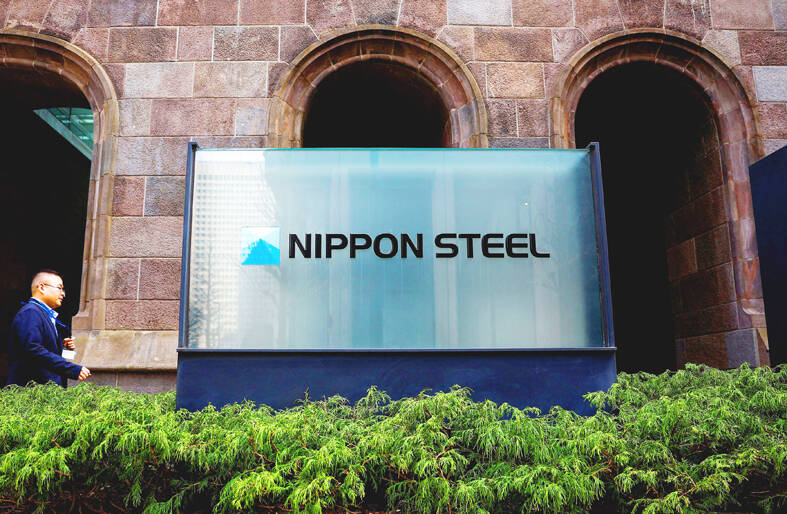Nippon Steel Corp, the Japanese steel giant that helped China modernize its mills, is worried that a glut of the metal in its neighbor could hurt its domestic market.
The world’s fourth-largest steelmaker wants the Japanese government to impose an anti-dumping tariff on Chinese steel, the company’s executive vice president Takahiro Mori said.
The company is lobbying Tokyo, along with other Japanese mills, to take protective measures due to concerns that exports from China could increase further, he said in an interview this week.

Photo: Reuters
China’s steel exports surged this year to their highest since 2016, as local demand has slumped due to a protracted crisis in the property market. Fears that other countries are becoming a dumping ground for China’s excess product has led to increased trade measures against the world’s biggest producer.
A lot of other countries, including in Europe, the US and South Korea have introduced defensive measures, which means that “exports will pour into Japan if it’s the only one without them,” Mori said.
Steel mills globally, including those in China, are feeling the pressure of the market’s downturn. The world’s biggest steel producer, China Baowu Steel Group Corp (中國寶武鋼鐵集團), earlier this month said that the Chinese steel sector is in a “harsh winter” that might be more challenging than the conditions seen in 2008 and 2015.
Nippon Steel is also bracing for what it calls an “unprecedentedly harsh business environment.”
Nippon Steel helped launch China’s industry in the late 1970s by providing technology and expertise. The company assisted Baowu’s listed unit in building its first major coastal steel mill in Shanghai, completed in 1985, and their cooperation helped ease often difficult relations between the two nations, which reached their nadir with Japan’s occupation in the World War II.
China has since replaced Japan as the world’s dominant producer and antagonism between the two countries continues to periodically flare. On a commercial level, that has included a lawsuit filed in 2021 by Nippon Steel seeking compensation for patent infringements by Toyota Motor Corp and its supplier, Baowu’s unit Baoshan Iron & Steel Co (寶山鋼鐵).
Nippon Steel exited a joint venture with Baosteel last month as Japanese vehicle makers struggle to maintain market share in Asia’s biggest economy.
The company would make decisions on other joint ventures it has in China on a case-by-case basis, Mori said, adding that the firm would expand investment in the US, India and ASEAN region instead.
Baosteel for its part is expecting to sell even more steel abroad.
The company on Thursday said it aims to increase exports to more than 10 million tonnes by 2028, despite rising trade frictions, from as little as 6 million tonnes this year.
Mori also said that Nippon Steel remains positive it can close its acquisition of US Steel Corp, a US$14.1 billion deal that has become politically sensitive during this year’s US presidential race.

KEEPING UP: The acquisition of a cleanroom in Taiwan would enable Micron to increase production in a market where demand continues to outpace supply, a Micron official said Micron Technology Inc has signed a letter of intent to buy a fabrication site in Taiwan from Powerchip Semiconductor Manufacturing Corp (力積電) for US$1.8 billion to expand its production of memory chips. Micron would take control of the P5 site in Miaoli County’s Tongluo Township (銅鑼) and plans to ramp up DRAM production in phases after the transaction closes in the second quarter, the company said in a statement on Saturday. The acquisition includes an existing 12 inch fab cleanroom of 27,871m2 and would further position Micron to address growing global demand for memory solutions, the company said. Micron expects the transaction to

Vincent Wei led fellow Singaporean farmers around an empty Malaysian plot, laying out plans for a greenhouse and rows of leafy vegetables. What he pitched was not just space for crops, but a lifeline for growers struggling to make ends meet in a city-state with high prices and little vacant land. The future agriculture hub is part of a joint special economic zone launched last year by the two neighbors, expected to cost US$123 million and produce 10,000 tonnes of fresh produce annually. It is attracting Singaporean farmers with promises of cheaper land, labor and energy just over the border.

US actor Matthew McConaughey has filed recordings of his image and voice with US patent authorities to protect them from unauthorized usage by artificial intelligence (AI) platforms, a representative said earlier this week. Several video clips and audio recordings were registered by the commercial arm of the Just Keep Livin’ Foundation, a non-profit created by the Oscar-winning actor and his wife, Camila, according to the US Patent and Trademark Office database. Many artists are increasingly concerned about the uncontrolled use of their image via generative AI since the rollout of ChatGPT and other AI-powered tools. Several US states have adopted

A proposed billionaires’ tax in California has ignited a political uproar in Silicon Valley, with tech titans threatening to leave the state while California Governor Gavin Newsom of the Democratic Party maneuvers to defeat a levy that he fears would lead to an exodus of wealth. A technology mecca, California has more billionaires than any other US state — a few hundred, by some estimates. About half its personal income tax revenue, a financial backbone in the nearly US$350 billion budget, comes from the top 1 percent of earners. A large healthcare union is attempting to place a proposal before